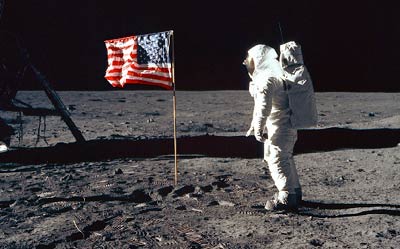Why America needs spaceby Zach Miller
|
| Yet, what people crave, what energizes our souls with wonder and ignites a patriotic fire in our bones, is sending humans beyond Earth orbit. |
The interesting part is how Thiel implied his support for Mars exploration and the prioritization of space activity in general. Furthermore, because he mentioned his support for the space program amidst his condemnation of cultural disunity, I cannot help but to associate the two in an inverse relationship. Mr. Thiel’s speech instilled this thought in me: what America needs now is a renewed interest in some cause: some great, ambitious effort to consolidate American pride and to bring together the pieces of big-picture America.
The unifying cause America needs is revitalized human space exploration.
The Apollo program provided us with such unity in the Cold War era. After President Kennedy’s 1961 speech that set the goal of landing a man on the Moon by the end of the decade, the nation strove towards that single goal, which we ultimately achieved. Since then, human space exploration was put on the back burner, and priority was given to scientific research efforts in Earth orbit, in particular the International Space Station. Though the effectiveness of these endeavors is debatable, they have nonetheless given the world valuable information from scientific research.
Yet, what people crave, what energizes our souls with wonder and ignites a patriotic fire in our bones, is sending humans beyond Earth orbit. A new era of space exploration is approaching, and fittingly, this decade and the year of the Apollo 11 Moon landing are the only times in history that public interest in space has climbed to over 50 percent.
Evidently, what the public wants to see is humans putting their lives at risk to put the footprint of civilization on another world. According to Pew Research surveys conducted in 2010, a majority of Americans—58 percent—think that the United States must be the world leader in space exploration. Another majority, 59 percent, said that astronauts are critical to space exploration. Out of ten government agencies, NASA had the fewest unfavorable ratings and the second highest favorable ratings. Mind you, much has happened in the space industry since 2010, but it is very likely that those ratings have increased.
Even more importantly, the new leaders in the space industry are in the commercial sector, further increasing the favorability of space activities. Casey Drier, director of advocacy for the Planetary Society, said in 2015, “What has really driven space policy historically—particularly with the Apollo missions—was national security interests”. Now, the driving factor within the commercial sector is either profitability or ideals, seen in the likes of Elon Musk.
| An increased concentration on a reenergized space exploration program of some kind will bring Americans together to a degree greater than any other endeavor. |
Public interest in space still exists—the only trick is figuring out how to tap into it. There is something uniquely inspirational about space. Anyone can recall nights of looking up at the stars and feeling awestruck at the immensity of our universe. To many members of the public, going to space may seem like fantasy, but the concept of space exploration is very much real. The way to tap into public interest in space is undoubtedly through revitalizing the human space exploration program.
That is what NASA set out to do with its Space Launch System and Orion programs. But that is also what SpaceX is doing with the Falcon rockets and Dragon capsules. That is what Boeing is doing with the CST-100 Starliner. That is why Mars One recruited hundreds of volunteers for a one-way mission to Mars. That is why Planetary Resources and Deep Space Industries are seeking to profit from extraterrestrial mining. The commercial space sector arose in part because NASA was not fulfilling public demand for more human space exploration.
This is what America needs: to unite behind a cause that alters our worldview with the feeling of pursuing something greater than ourselves. An increased concentration on a reenergized space exploration program of some kind will bring Americans together to a degree greater than any other endeavor. As Americans, we must come together behind a cause greater than ourselves. Only then can we resolve our social conflict, and only then will the United States plunge headstrong into the greatest feat ever sought by our great nation. We must not only invest resources into space exploration; we must also invest our spirit.
